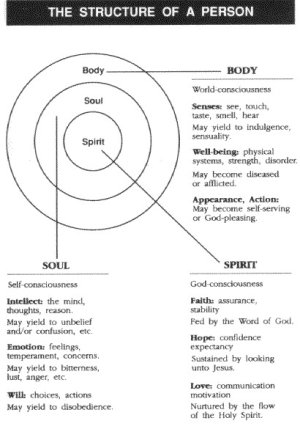Theophilus
Active member
Exactly what is our soul? Here's a definition from my Study Bible that I like, but I would like to hear what the other members here at BAM have to say on the topic.
SOUL—a word with two distinct meanings in the Bible:
1. That which makes a human body alive. The word used in the New Testament for soul occurs in reference to “life,” for example, in Mark 8:35–36: “For whoever desires to save his life [soul] will lose it,” Jesus declared, “but whoever loses his life [soul] for My sake and the gospel’s will save it. For what will it profit a man if he gains the whole world, and loses his own soul?” The same idea—regarding physical life—is also present in the Old Testament. For example, the soul of a dying person departed at death (Gen. 35:18). The prophet Elijah brought a child back to life by stretching himself upon the child three times and praying that God would let the child’s soul come back into him (1 Kin. 17:19–23).
2. Foremost, however, is the use of the word soul as it refers to the inner life of man, the seat of his emotions, and the center of human personality. The first use of the word soul in the Old Testament expresses this meaning: “And the Lord God formed man of the dust of the ground, and breathed into his nostrils the breath of life; and man became a living being (soul)” (Gen. 2:7). This means more than being given physical life, but the statement that man became a “living soul” indicates his uniqueness as a fully conscious, coherent, responsible, moral being with a capacity for a spiritual relationship with God.
The soul is described as the seat of many emotions and desires: the desire for food (Deut. 12:20–21), love (Song 1:7), longing for God (Ps. 63:1), rejoicing (Ps. 86:4), knowing (Ps. 139:14), and memory (Lam. 3:20).
In the New Testament, Jesus spoke of his soul as being “exceedingly sorrowful” (Matt. 26:38). Mary, the mother of Jesus, proclaimed that her soul “magnifies the Lord” (Luke 1:46). John prayed that a believer would “prosper in all things and be in health, just as your soul prospers” (3 John 2).
The chart below may help describe the distinction between the soul and spirit (Heb. 4:12).

SOUL—a word with two distinct meanings in the Bible:
1. That which makes a human body alive. The word used in the New Testament for soul occurs in reference to “life,” for example, in Mark 8:35–36: “For whoever desires to save his life [soul] will lose it,” Jesus declared, “but whoever loses his life [soul] for My sake and the gospel’s will save it. For what will it profit a man if he gains the whole world, and loses his own soul?” The same idea—regarding physical life—is also present in the Old Testament. For example, the soul of a dying person departed at death (Gen. 35:18). The prophet Elijah brought a child back to life by stretching himself upon the child three times and praying that God would let the child’s soul come back into him (1 Kin. 17:19–23).
2. Foremost, however, is the use of the word soul as it refers to the inner life of man, the seat of his emotions, and the center of human personality. The first use of the word soul in the Old Testament expresses this meaning: “And the Lord God formed man of the dust of the ground, and breathed into his nostrils the breath of life; and man became a living being (soul)” (Gen. 2:7). This means more than being given physical life, but the statement that man became a “living soul” indicates his uniqueness as a fully conscious, coherent, responsible, moral being with a capacity for a spiritual relationship with God.
The soul is described as the seat of many emotions and desires: the desire for food (Deut. 12:20–21), love (Song 1:7), longing for God (Ps. 63:1), rejoicing (Ps. 86:4), knowing (Ps. 139:14), and memory (Lam. 3:20).
In the New Testament, Jesus spoke of his soul as being “exceedingly sorrowful” (Matt. 26:38). Mary, the mother of Jesus, proclaimed that her soul “magnifies the Lord” (Luke 1:46). John prayed that a believer would “prosper in all things and be in health, just as your soul prospers” (3 John 2).
The chart below may help describe the distinction between the soul and spirit (Heb. 4:12).
